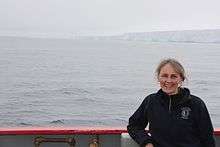Karen Heywood
| Karen Heywood | |
|---|---|
 | |
| Nationality | Britain |
| Fields | Polar oceanography |
| Institutions | University of East Anglia |
| Alma mater | University of Bristol |
| Notable awards | Georg Wüst Prize in 2009 |
|
Website Karen Heywood at University of East Anglia | |
Karen Heywood is a British Antarctic oceanographer best known for her work developing autonomous measurements of the Southern Ocean.
Early life and education
Karen Heywood started her academic career with a BSc in Physics at University of Bristol followed by a Physical Oceanography CASE PhD studentship at the University of Southampton and former Institute of Oceanographic Sciences, looking at the heat budgets of mixed layers. Following this Heywood undertook a postdoc position at Bangor University, working on eddies caused by flow around the Indian Ocean island of Aldabra.
Career and impact
In 1989 Heywood arrived at the UEA for a lectureship in physical oceanography and was awarded a professorship in 2005, when she became the first female professor of oceanography in the UK.[1] Since then Heywood has trained more than 35 PhD students in a personal mission to increase the amount of observational oceanographers in the UK.
During the 1990s Heywood was heavily involved in the World Ocean Circulation Experiment (WOCE), serving as Chief Scientist of the A23 WOCE hydrographic section from Antarctica to Brazil in 1995. This sparked a lasting interest in the Antarctic and Southern Ocean water masses and formation processes, and Heywood has since led several projects in polar regions developing and maintaining a close collaboration with the British Antarctic Survey team.
Heywood has led the field in using autonomous underwater gliders and is currently leading the UEA Seaglider group as well as providing community leadership in observational oceanography and autonomous ocean observing. She was the UK’s first female physical oceanography Professor.
Awards and honours
Karen Heywood received the Georg Wüst Prize in 2009 for her work in the southern ocean. Heywood was awarded The 2016 Challenger Medal in recognition of her major contribution to physical oceanography both in the UK and worldwide; particularly for her contribution to understanding physical oceanographic processes in the Antarctic, for her work in applying novel techniques to understanding ocean processes and for her wider work in developing UK marine science, particularly within SCOR (Scientific Committee for Oceanographic Research).[2]
The Society for Underwater Technology presented its 2015 Oceanography Award to Heywood for her outstanding contribution to the field of oceanography. In particular because she was an early advocate for the use of autonomous underwater vehicles (AUVs) as carriers of sensors and samplers in experiments. Her recent work on this topic has seen undersea gliders being used in the Antarctic, including under icebergs.[3]
References
- ↑ "Women in Oceanography: A Decade Later" (PDF). tos.org.
- ↑ "Prof. Karen Heywood - University of Liverpool". www.liverpool.ac.uk. Retrieved 2016-06-17.
- ↑ "Subsea compression innovator presented with President's Award by SUT". www.sut.org. Society for Underwater Technology. Retrieved 2016-06-17.